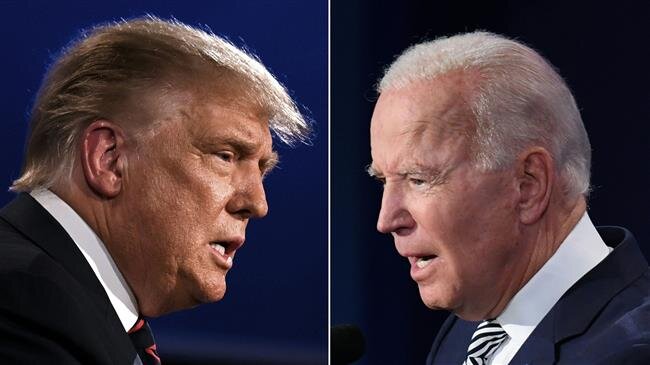Zarif: No difference between Trump, Biden but Biden's words are 'more promising'

TEHRAN — Foreign Minister Mohammad Javad Zarif has said the statements by Joe Biden with regard to Iran have been more promising than those of the incumbent Donald Trump.
"The statements by the Biden camp have been more promising, but we will have to wait and see," Zarif said in an interview with CBS News.
He made the remarks when pushed to pick one of the two U.S. presidential candidates. Zarif initially insisted that Tehran has no preference between Trump or Biden.
He emphasized that it's not what the new administration says during the campaign that counts, but what it does in office.
"What is important for us is how the White House behaves after the election, not what promises are there, what slogans are made. The behavior of the U.S. is important. If the U.S. decides to stop its malign behavior against Iran, then it will be a different story no matter who sits in the White House," the chief Iranian diplomat said.
Tensions soared between Tehran and Washington since Trump unilaterally withdrew the U.S. from the nuclear deal on May 8, 2018. The U.S. president not only exited the deal but has since targeted Iran with a series of harsh economic bans. Trump has called the sanctions his "maximum pressure" campaign aimed at forcing Iran to renegotiate the nuclear deal.
The Biden campaign has signaled that if he becomes president his administration would try to renegotiate the nuclear deal, officially known as the Joint Comprehensive Plan of Action (JCPOA), which was struck when he was vice president.
Zarif, on the other hand, insisted that "under no circumstances" would Tehran consider renegotiating the terms of the deal which was adopted as a UN Security Council Resolution.
"If we wanted to do that [renegotiate], we would have done it with President Trump four years ago," Zarif told CBS News.
He was categorical that Iran would, instead, like to see the U.S. re-join the JCPOA.
"We can find a way to re-engage, obviously. But reengagement does not mean renegotiation," he said. "It means the U.S. coming back to the negotiating table."
Zarif also said that the Trump administration's "maximum pressure" campaign has failed.
"It has hurt Iran," he said. "But it hasn't brought the type of political change that the U.S. desired — be it regime change, which was the desire of a certain segment of the current U.S. administration, or what President Trump wanted, which was to bring Iran to its knees so that he could dictate his terms of negotiations."
"I know that Vice President Biden understands that that won't happen [renegotiate the terms of the nuclear deal], and may act differently," said the foreign minister.
He expressed hope, however, that Trump, too, "is capable of acting differently."
Zarif also addressed assertions from U.S. intelligence agencies that his country obtained U.S. voter registration information and used it to try to erode confidence in the American election process.
He categorically denied any interference by Iran, and called Trump "the single person who is making the most important and effective affront against the U.S. electoral system."
Anyone interested in undermining U.S. democracy, Zarif suggested, "will just ask President Trump to continue talking about forgeries and inconsistencies in mail-in ballots and all sorts of other stuff."
Zarif said the Iranian government received a letter from the Trump administration, warning Tehran not to take action around the election, and that the U.S. would not tolerate any interference.
MH/PA
